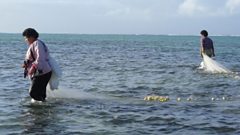Longitude Prize Winner; Solar cells; New species; Fiji fisherwomen; Physics questions
Dr Adam Rutherford learns about the next steps for the Longitude Prize 2014 winning challenge - tackling resistance to antibiotics.
Longitude Prize 2014 Winning Challenge
Antibiotics resistance has been selected as the focus for the £10m prize. The World Health Organization (WHO) has warned of a "post-antibiotic era" where key drugs no longer work and people die from previously treatable infections. The next step in the challenge is to tackle this resistance, by developing a simple, cheap, quick test that allows you to tell whether an infection is bacterial or not. This will conserve the 50% of antibiotics that are currently given in situations where they have no effect.
Solar Cells
A popular form of photovoltaic, or solar, cells is made using a harmful and expensive chemical called cadmium chloride. Now a team has found a new, cheaper, safer way of making solar cells by replacing the toxic element in the process with a material found in bath salts, magnesium chloride, and these are just as efficient. Professor Ken Durose from Liverpool University explains how it could reduce the cost of solar energy.
New Species
How easy is it to find a new species for science? Whilst in the Bornean jungle, Dr Tim Cockerill discovered that it was relatively easy - one fell in his cup of tea! It was a tiny parasitic wasp. Another new species, of the same type of parasitic wasp, was recently discovered in a school playground in the UK. So new insects seem to be quite easy to find, but what about a new mammal or bird? Tim reveals that finding the creature is just the start of a lot of work needed to get his finding published and accepted.
Fijian Fisherwomen
More and more conservationists are turning to local knowledge to work out the best way to save ecosystems. A great illustration of this grass-roots approach is underway in Fiji. They use a traditional system where villages will close an area of fishing grounds for a few months for fish stocks to recover. Conservationists are now learning about this system, known as 'tambu', to see if it can be used on a longer-term basis to help give fish stocks, that have become seriously depleted in the last few decades, a chance to recover.
Physics questions
University College London cosmologist, Andrew Pontzen answers questions sent in by listeners about why, given the immense heat at the Big Bang, is there so much hydrogen in the universe, and not more of the larger atoms, which are forged under conditions of great heat? And are black holes responsible for the missing matter in the universe?
Producer: Fiona Roberts.
Last on
Broadcasts
- Thu 26 Jun 2014 16:30BBC Radio 4
- Thu 26 Jun 2014 21:00BBC Radio 4
Explore further with The Open University
Podcast
-
![]()
BBC Inside Science
A weekly programme looking at the science that's changing our world.




